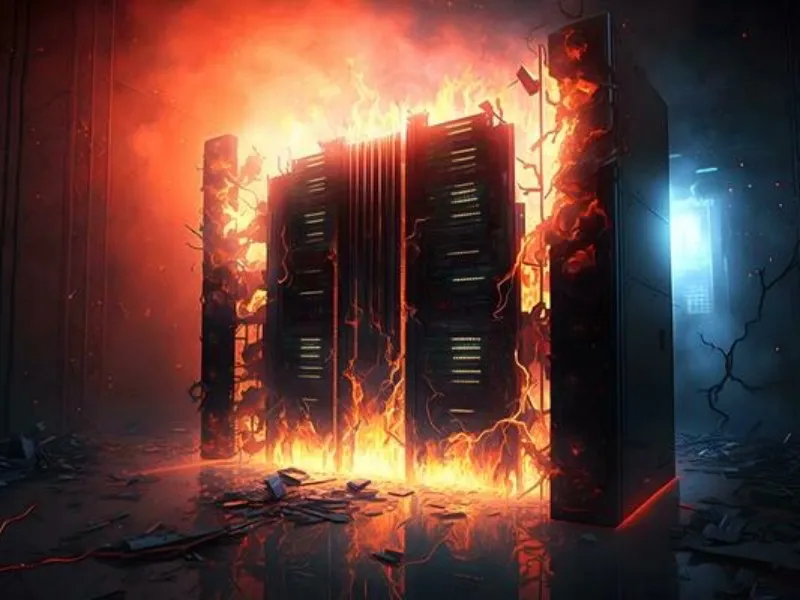- A fire-rated server room is designed to withstand fire for a specific duration, typically measured in hours.
- By taking several essential practices, organisations can safeguard their valuable data assets, comply with industry standards, and ensure operational continuity in the face of potential disasters.
A fire-rated server room is designed to withstand fire for a specific duration, typically measured in hours. This means the walls, ceilings, and floors are constructed with materials that can resist fire, preventing it from spreading and giving critical systems time to be safely shut down or recovered. The importance of this feature cannot be overstated, given the catastrophic potential of a fire in a data centre.
Consider the case of the 2017 fire at OVH’s Strasbourg data centre, which destroyed a significant portion of the facility. Despite having some fire protection measures, the incident led to massive data loss and operational disruptions. The fire quickly spread across the data centre, illustrating how a lack of comprehensive fire protection can result in severe consequences.
Also read: What is disaster recovery and how does it work?
Why fire-rating matters
Fire-rated server rooms play a crucial role in safeguarding sensitive data, especially in an era marked by frequent cyberattacks and physical threats. Their primary function is to shield data from both fire and the potential data loss that could follow.
For instance, the 2020 fire at a data centre in the Netherlands highlighted the severe consequences of inadequate fire protection, as it resulted in significant data loss for numerous businesses dependent on that facility. This event underscores the critical importance of robust fire-rated infrastructure to prevent similar disasters.
Compliance with fire safety standards is another significant reason for implementing fire-rated server rooms. Industries such as finance and healthcare, which handle sensitive information, are often subject to stringent regulations.
For instance, the Payment Card Industry Data Security Standard (PCI DSS) mandates specific fire safety measures for data centres. Adhering to these standards not only ensures the protection of data but also impacts insurance costs. Organisations with fire-rated server rooms may enjoy lower insurance premiums due to their reduced risk profiles.
Operational continuity during a fire is another vital benefit of fire-rated server rooms. These rooms can contain the spread of flames, providing crucial time for emergency response and recovery. Consider a major financial institution with a fire-rated server room. When a fire started elsewhere in the building, the fire-rated walls prevented the blaze from reaching the server room, allowing backup systems to function and averting a potential financial crisis. This example illustrates how fire-rated features can be instrumental in maintaining business operations and mitigating damage.
Also read: SK Hynix hits record profit amid AI chip demand surge
Best practices for implementing fire-rated server rooms
To ensure that a server room is adequately fire-rated, several best practices should be followed. Investing in quality materials is essential. Fire-resistant materials for walls, ceilings, and floors, such as gypsum board, concrete, and fire-rated glass, provide the necessary protection. For instance, data centres operated by Equinix invest significantly in these materials to maximize fire safety and safeguard their infrastructure.
In addition to structural fire resistance, installing advanced fire suppression systems is crucial. These systems, like inert gas or clean agent systems, can extinguish fires without damaging sensitive electronic equipment. Google’s data centres are a prime example, employing sophisticated suppression systems designed to protect against fires while preserving data integrity.
Regular maintenance and inspections are necessary to ensure that fire-rated features continue to function effectively over time. Data centres should conduct routine fire drills and inspections to verify that all fire protection systems are in optimal working order. This proactive approach helps maintain the reliability of fire safety measures and prepares staff for emergencies.
Implementing comprehensive fire safety protocols is also vital. Detailed fire safety plans should include emergency response procedures, evacuation strategies, and regular staff training. For example, IBM integrates extensive fire safety protocols into its data centre operations, ensuring that all employees are well-prepared to respond quickly and effectively in the event of a fire.
Fire-rated server rooms are an essential component of a robust data protection strategy. By investing in fire-resistant construction, advanced suppression systems, and rigorous maintenance, organisations can safeguard their valuable data assets, comply with industry standards, and ensure operational continuity in the face of potential disasters. The stakes are high, and the consequences of inadequate fire protection can be severe. Therefore, treating fire rating not as an option but as a critical necessity is crucial for any organisation relying on server room infrastructure.

